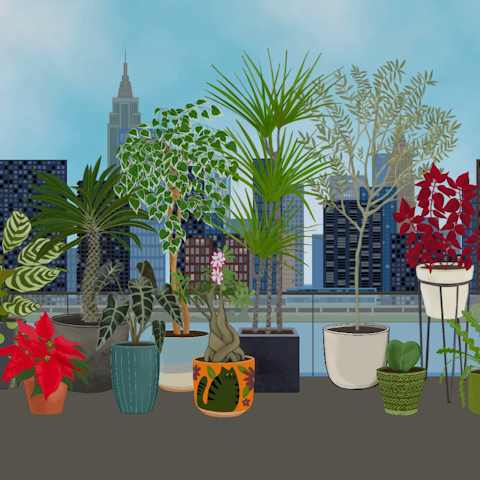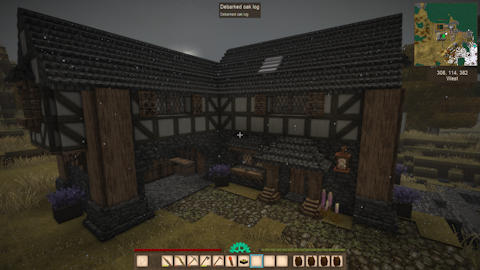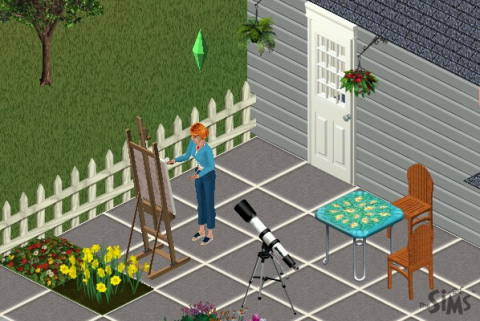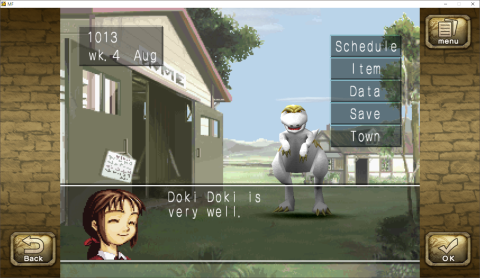 Game Reviews -- 2023
Game Reviews -- 2023



12/01/2023 -- Plant Therapy
Platform: PC (Steam, Itch)

Billed as an "unapologetically cozy" plant-collecting sim, Plant Therapy sees you moving into your new New York City apartment and getting your green thumb on. An idle-ish game, your plants generate coins which you can use to buy art, decor, and of course more plants.
The presentation is pretty laid-back, with some nice artwork on the plants in particular. You might not be dancing to the ingame music, but it's inoffensive at worst. There's some good work with the effects, like the sparkles on coin pickups and the glow of plants at night. All in all, pretty charming.
It plays rather similarly to another game I've reviewed, Plant Daddy. While both games are free, Plant Therapy does have some cheap paid DLC you can purchase to add more plants, items, and a large new apartment. There are other things to distinguish the games: Plant Therapy has more of a day/night cycle, more options for plants and decor, and a number of achievements which should keep you occupied for at least a couple of days. In fact, if you purchase the DLCs, you may have a harder time tracking down a particular plant or item you need in the larger pool (something the dev is aware of and possibly working to fix).
It's not the most exciting, fast-paced game in the world, but I'd say Plant Therapy hits the mark for a good, cozy time-waster. I reccomend it for anyone with a love of plants or gardening, even if you haven't got the greenest of thumbs IRL. Get a hot drink, cozy up and decorate an apartment with all the plants and balloon dog statues your heart desires.



08/30/2023 -- Vintage Story
Platform: PC

Vintage Story is a voxel-based survival game set in a post-apocalyptic wilderness. The player, a mysterious blue being called a Seraph, must survive the dangers of the wild as well as rusty horrors from a temporally unbalanced plane. With time and a lot of effort, they can learn to thrive and even begin to unravel the mysteries of this fallen world.
Right away, the comparisons to Minecraft are obvious. In fact, as someone who's played a lot of Minecraft mods, I can tell you that Vintage Story takes clear and heavy inspiration from a Minecraft total conversion mod called Terrafirmacraft. Everything from knapping stone, to firing pit kilns, to managing soil nutrients is very familiar if you've played that mod.
Still, there's a lot to be said for breaking away from the Minecraft engine. In Vintage Story, crafting is much more tactile and immersive than Minecraft or Terrafirmacraft could ever achieve. You physically knock the voxels off a stone knife, build clay forms layer by layer, push white-hot metal around with your hammer on an anvil. It's very cool, if a little tedious when you're crafting in bulk.
Everything in Vintage Story takes time. A lot of time. Casting metal, tanning leather, farming plants. Domesticating animals is a generations-long process of slow familiarization. Higher-tier metallurgy takes huge amounts of time, resources and infrastructure. And everything involves copious amounts of slow exploration of the world around you.
All the while, you'll be beset with danger. Wolves and bears are the mundane concerns. But more sinister are the Drifters that spawn from temporal rifts and swarm in terrifying temporal storms. These are part of the game's eldritch horror trappings. Some players call this the weakest part of the game, and it can get a bit annoying--but thankfully, Vintage Story is very customizable. When you create a world, you can set a ton of options, from death penalties to the durability of your tools. You can even turn off monsters and all the associated lore to play a pure wilderness survival game, if you desire.
My partner and I played on a server together for nearly two ingame years. In that time, we got to steel, the top-tier metal, and experienced much of the game. Still, thanks to the capricious hand of RNG, there was plenty we didn't see. I'm still salty about never finding salt, and we didn't get to experience the game's major dungeon, called the Resonance Archive.
I greatly enjoyed my time with Vintage Story. I'd heartily reccomend it if you've ever felt the Minecraft survival experience was lacking. If possible, I'd reccomend playing on a multiplayer server, so that you can divide the labor with your friends. But if you're into deep survival experiences, I think you'll have fun regardless.



06/30/2023 -- The Sims
Platform: PC, PlayStation 2, GameCube, Xbox

I first encountered this series as a young child with a copy of The Sims: Double Deluxe. I wasn't very good at the game, but I amused myself with the cheats and taking ladders out of pools. I've had an off-and-on relationship with the franchise since then. Now, however, with rumors of Sims 5 on the horizon, I've decided to play through the series, feeling nostalgia and exploring the evolution of the games. This review is the beginning of that journey for me, with The Sims: Complete Collection.
Ahhh, the original Sims. It's hard to separate my nostalgia for this game and come at it with an objective opinion. The graphics are, obviously, dated, and I had to use a third-party widescreen patch just to get the game to work correctly with my monitor. The isometric view and 2D items feel undoubtedly limiting compared to later entries. And dear god, the Comic Sans.
Still, I think there's something undoubtedly charming about its style. This retro 60's theme sets it apart from later games' contemporary fashions. The characters are detailed and interesting enough to be distinct even from the zoomed-out view. And the soundtrack is still an absolute banger.
Gameplay-wise, The Sims feels at once more limited than its successors, and yet compelling in its gameplay loop. While many will argue the series has tended more towards being a "story-facilitator" for people to weave their own tales, The Sims is actually something of a challenge. Those motive bars go down fast, and if you're not careful, your sim will quickly begin to break down. Of course, once you've got a groove going and have earned some simoleons, you can buy better stuff to keep your sims happier. The game opens up-- While there's not quite as much to do as in later games, you can go on dates, adopt pets, or weave spells, among other things.
Things are somewhat less zany than other entries in the franchise. There are fewer sudden deaths, and you have to actively choose to partake in things like magic. That's not to say there's no wackiness, though. Just ask my poor sim who got abducted by aliens.
I had a lot of fun with The Sims. I got to relive my nostalgia, made new memories, and even dipped my toes into the game's custom content scene (smaller than later games', and much of what there was has sadly been lost to time; this tumblr post is a great compilation of the remaining Sims 1 CC sites). I'd recommend the original Sims, not only to those with fond childhood memories of the game, but also those looking for more of a challenge to their dollhouse simulator, or those interested in the history of the franchise. You'll have a great time looking back.
Just, steel yourself for all that Comic Sans.



04/23/2023 -- Monster Rancher 1 DX
Platform: Switch, PC (Steam), iOS

Monster Rancher is a series of monster-raising games originally from the late 90s. The first two games, Monster Rancher 1 & 2, were re-released in a bundle in 2021. This review concerns the first game, Monster Rancher 1 DX.
For those unfamiliar, the gameplay of Monster Rancher centers around raising a monster (usually one at a time), with the goal of entering and winning battle competitions against other monster tamers. Of course, the first step is obtaining a monster: Monster Rancher's gimmick in its original release was that you could put CDs into the disk drive of your console and generate monsters from them. For the 2021 ports, this has been replaced by a searchable database of titles. This perhaps removes some of the magic of creating monsters from your collection of CDs, but I think it's the most reasonable compromise for modern systems.
From this point, Monster Rancher is a mostly menu-based game. In order to shape your monster into the best it can be, you must train it, and in order to fund said training, you put it to work. Once trained, you can enter tournaments and battle with your monster. Later, you can also unlock tile-based exploration missions. However, you will predominantly be navigating menus each ingame week, deciding what to feed your monster, whether to work or train or rest it, or buying items from the shop. It can get pretty repetitive, especially once you figure out a consistent schedule, likely only broken once in a few months for tournaments or missions. Your monster will grow through the course of in-game years, and, eventually, die, though you can "freeze" it in storage to prevent this and raise a new monster.
The graphics don't seem to have been altered in the port, save for the menu buttons at the sides of the screen. The soundtrack has been remastered, though you can choose to use the originals in the options menu. Gameplay is unchanged, too, though there is the addition of uploading your monster to battle in PVP tournaments, which I didn't explore.
It took me about thirteen hours to sweep the final tournaments and roll the credits. I did follow a guide after raising my first couple monsters on my own, and even after "beating" the game, there are a number of unlockables and secrets to find. I wasn't terribly motivated to get these.
While I did feel a bond with each of my monsters, it felt tedious making the same menu choices over and over. It was also pretty easy to steamroll the competition, once I knew the strategy. All in all, Monster Rancher is just an okay game for me. Not great, not terrible. If you're looking for a recommendation, I'd say go for it if you're a big monster-raising fan, but keep your expectations in check. Maybe avoid guides at first, too, since the experimentation is more interesting than the optimized gameplay.
